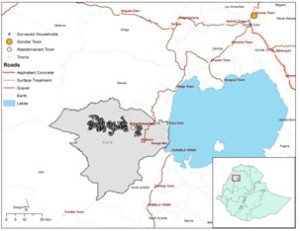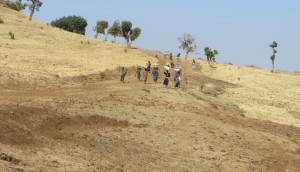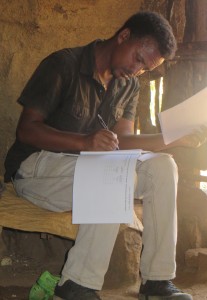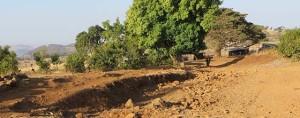Last week marked the end of the 2nd round household survey. Its purpose has been to assess the impact of remoteness on village communities in Alefa Woreda, south-west of Gonder. This is an isolated area with little or no electricity and mobile phone access. The terrain is rugged and the lack of access to markets on communities in this region is strongly felt. The research first started in 2012, and now two years on, still no road has been constructed.
Reasons for research
Trade in commodities relies on an infrastructure that enables exchanges to take place easily. In the absence of roads, people in remote communities are dependent on traditional methods of transport – by foot or by donkey – in order to access those critical markets for trade and livelihoods. In order to bring produce from households in such communities to market, the process remains arduous and strenuous. There are, however, financial rewards from transactions afforded to those remote households who reach out to markets further afield from their immediate community.
The results from this household survey will assess the benefits and returns on investing in rural feeder roads to bring remote rural communities better opportunities for trade. Within a much broader picture, if infrastructure were improved, not only would this impact commodity markets, but access to health, nutrition and education services would likely advance in these rural and deprived communities.
Collecting data
The team of 31 dedicated enumerators underwent considerable physical demands to access remote villages in difficult terrain. When at the collections site though, households were hospitable and willing to participate. In total, more than 830 households were surveyed in 34 days.
IFPRI placed substantial effort to fully train the enumerators (and the 5 supervisors) to internalize techniques for the data collection process, and continued to offer support so that the quality of the data collected was consistent as well as capturing the unexaggerated truth from those sampled households. The supervisors’ role was to check consistency of data from the field questionnaires, assess and mentor enumerators, communicate with local officials, and to facilitate interviews and community discussions. These efforts to thoroughly train and consolidate the enumerators’ skills, along with providing support from IFPRI throughout the project, both physically and morally, appear to have paid off, and furthermore have strengthened capacity for future projects.
Comments from the field
5 supervisors and a coordinator planned and structured the enumerators’ workloads, paying full attention to the distances and walking times to survey sites. From the field team’s feedback, there was good cooperation from community groups and individual households. Most notable was the dedication and positive attitude of the enumerators as they undertook the somewhat tedious and challenging task, as well as their handling of potential environmental risks, such as snakes and scorpions which are common in the vicinity.
One major challenge was managing expectations among households regarding a potential new road in the area. IFPRI’s research role was clearly explained, emphasizing that the researchers are not road construction experts, however there remains an expectancy and optimism for a better infrastructure before too long.
Next steps
Gathering all the surveys together from the field, and then the data entry begins!
Sponsor
International Growth Center (IGC)
LINK TO WORKING PAPER



